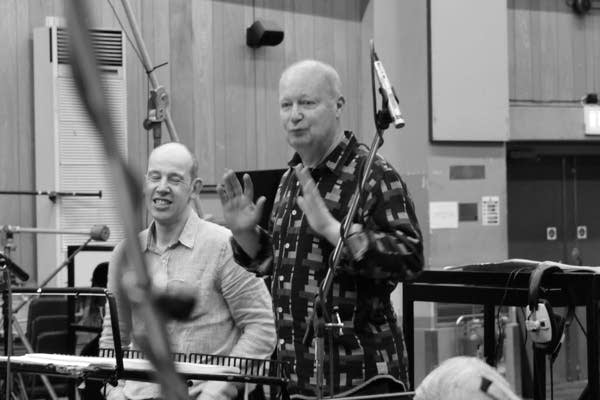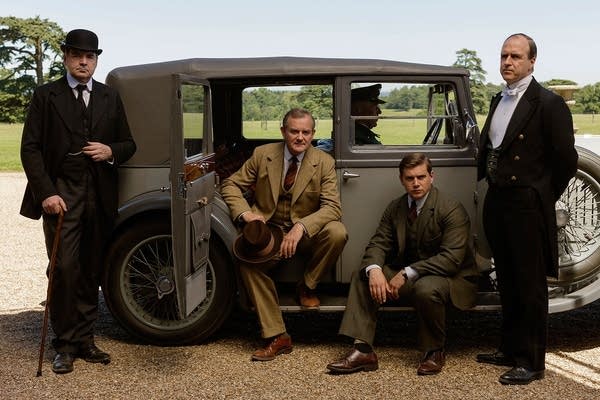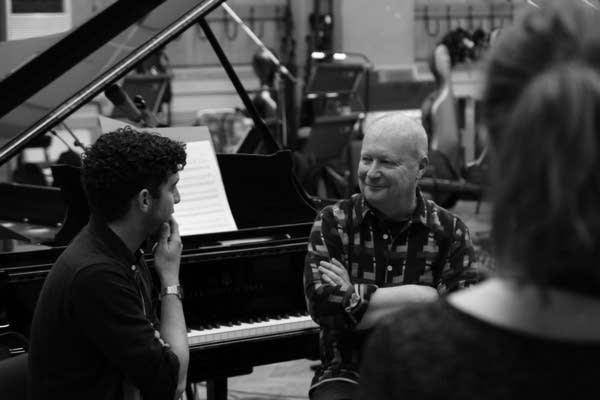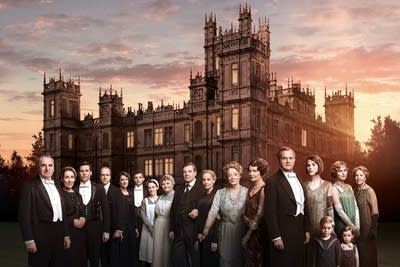In the popular television series Downton Abbey, there is a lot to capture viewers' attention: the intricately drawn characters, the stunning photography, the witty dialogue, the period costumes, the gripping storylines. Undergirding all of it is captivating music.

Ever since Downton Abbey began its run in 2010, composer John Lunn has written all of the music for the program. "I'm manipulating what's going on quite a lot underneath the dialogue," Lunn told us back in 2012. "I'm always trying to look at a way of putting something else in there that, without it, you'd view the scene differently."
On Sunday, Jan. 3, 2016, Masterpiece: Downton Abbey begins the U.S. broadcast of its sixth and final season. As fans prepare for what's ahead for the beloved characters, Lunn reflects on where the program has been and shares a few details about what viewers will hear in the show's final season (without spoilers, naturally).
Whereas the American term for a periodic string of television programs is "season," in Britain, the preferred term is "series"; that's the word Lunn uses in the interview transcribed below as he spoke to us from his home in London.
In the press notes for Downton Abbey, Producer Chris Croucher says, "There weren't as many grand set pieces [in earlier seasons] whereas now there are far more. Every year we want to make it bigger and better." Have your composing assignments changed commensurately as the show's set pieces have expanded?
It hasn't really. Funnily enough, although those set pieces almost always require music, and they almost always require some kind of new music that we haven't quite had before — that happens a couple of times in series six — but really, the whole sort of concept behind the music hasn't really changed all that much. The music's either quite romantic or it's also slightly about the humor as well, and not so much about action in the set pieces. Although I have to say in series six, there's a couple of places where that does move away; in fact, we have a kind of sequence where I had to write music the like of which we've never done in Downton Abbey before, but I can't really give you that away!

But the brief hasn't really changed all that much; we've used virtually the same size of orchestra since series one [the orchestra for Downton Abbey consists of 33 strings — 10 first violins, eight second violins, six violas, six cellos, three basses — plus a horn section, a vibraphone and John Lunn himself on piano]. Some episodes might have a slightly bigger orchestra just because we maybe need to go slightly grander, but in general, no, it hasn't really changed all that much.
You're still using the Chamber Orchestra of London?
Yes.
And the instrumentation is generally the same?
Generally the same. The first couple of series tended to use a cor anglais — which is from the French, "English horn," and it is quite an English-sounding instrument. But actually in later series, as we've got into the '20s, I've tended to use a soprano saxophone a bit more than the cor anglais. So the cor anglais has kind of disappeared a bit. And in the very final Christmas, I've used a harp, and there's also an episode, I think it's the penultimate episode, I've used some trumpets. But generally, it still pretty much sounds like Downton.
The soprano saxophone, is that a hint at the Jazz Age?

It's trying to sound a little bit more modern. Actually, my music hasn't really touched on jazz, funnily enough. We've tended to steer away from that, because of course, the jazz of that period is always very, very lively, whereas the music for Downton is much more underscore and it's much more getting inside people's heads and things like that, which that style of jazz, certainly in the '20s, didn't really do. So I've tended to steer clear of jazz.
[Soprano sax] is also a little more versatile than a cor anglais, as well, because it can actually play quite high. It just sounds a little bit more modern; that's really the only real reason for using it.
One of the pieces created for the end of season three is the music for Duneagle, when the Crawleys visit the MacClare family. Did you feel particularly connected to that piece, given you're originally from Scotland?
Yeah, I did! I mean, nobody knew at any point I'd have to write any Scottish music, but it came very naturally to me. Although I haven't actually lived in Scotland for 35 years, I certainly grew up there, my accent's from there, my roots are there. I feel very Scottish, and I've written a lot of Scottish music over the years for quite a few films and TV series, so it came quite naturally to me.
Funnily enough, it's the one piece I get the most requests from. I did an edit from that episode and put it on my Soundcloud website, and it gets played more than anything else.
In the press notes for series six, a number of the producers and cast members noted that the story of Downton Abbey is set in the past, but not so long ago that it is out of reach; specifically, that a number of them may have had grandparents who were in service or had life experiences similar to those portrayed in Downton. Do you know if any of your predecessors had lives like what we see on screen?
My father's grandmother, I believe, was in some kind of service. We were definitely more downstairs than upstairs, I think! We definitely weren't from upstairs. But I never met her, and my father doesn't seem to remember her talking about that either. It's funny, I think it's kind of reached a little bit of a cutoff point where anybody remembers that world that well.
With this being the final series, there is a lot of talk about resolving storylines. Executive producer Gareth Naeme says, "Romantic love … has become one of the principal driving forces of the series — and romantic stories require resolution!" Certainly "resolution" is a musical term as well, but did the story resolutions, the finality of it all, affect your musical writing?
Yeah, it did. I started out series one, there was a specific idea about how the series was going to end at one point, and I started to sort of weave in a kind of theme which was kind of to do with the fading grandeur of the concept of these grand homes — it was becoming no longer viable. But then as we went through the series, the whole kind of concept for how it ends — which I can't tell you! — changed. It doesn't end the way I was originally expecting.
There is a lot of resolution, but not necessarily quite the way you would expect. But it is quite interesting for me, because I've always thought of the music as being about the relationships between characters, not specifically music for an individual character. The music has been much more about the relationships. And so that's kind of given me a good opportunity to go back.

For instance, Bates and Anna have got several tunes associated with them. Actually, their story kind of gets resolved in series five anyway, but there's another part to their relationship in series six, and it was nice to kind of go back to the very, very beginning of the series and bring back the music for them from when they first sort of met. So I have gone back to series one a bit, and kind of woven more of those tunes from series one back in, particularly when we get back more towards the final couple of episodes.
If we were to look more closely at the music for Anna and Bates, is there an instrument for you or a couple instruments that are the voice of the Bates, the voice of Anna, and illustrate this interplay?
Yeah, the sort of solo piano hip-hop — where I say "hip hop," I mean the hip, hop; hip, hop high figure that always kind of reminds me of Bates — I think I did that piano figure for Bates because it had a kind of hesitancy; in the early days, he didn't quite know how to behave, and he has a limp as well. So the music has always got this kind of hesitant quality to it.
And then there's a solo viola that I've used for Anna, and the two of them sort of merge together. It can become much bigger than that. But yeah, those are the two instruments that I've used quite a lot for them.
How did you decide to assign viola to Anna?
I'm not sure why, but there's something quite English about solo viola. Especially that music of the early 20th century where a lot of composers like Vaughan Williams and Elgar used that very sort of dark but nevertheless lyrical sonority that the viola can bring. I don't know, it just felt something of English about that sound, the solo viola.
Are there other instruments that hold a special place for characters' relationships?
Not so much instrumental; there's more tunes. For instance, Matthew and Mary had quite a few tunes, and Matthew unfortunately took some of my best tunes to the grave with him when he died!

But actually, there's one very poignant moment in the penultimate episode of the final series where actually I'm able to go back and revisit one of their tunes. That was very gratifying. I always feel, the way the series has evolved, it has actually helped me to come full circle. That's one of the great things about doing a long-running TV show as opposed to a film. If it's six years to craft and meld this material, it's quite interesting to be able to do that over such a long period of time.
With some of the storylines involving the character Thomas, you've had to write what you described as "sneaky music." Has that posed any particular challenges?
Yeah, that's quite difficult, that. Thomas is always quite difficult to write for because, on the one hand, he can be quite a nasty guy, but also on the other hand, he's got issues that were a problem particularly in those days he has to wrestle with, and so you do also feel there's a certain sense of sympathy with him, but then, he can also be his own worst enemy. I think music has to sort of sit on the fence a bit for Thomas, and that's quite difficult to do.
I remember in series three, where he's been led to believe the under-butler Jimmy was in love with him and would be open to advances by him, and he's been tricked. There's a moment when he's standing outside the door and he doesn't know whether to take a chance and go for it or not, and so I had to write this music which was slightly almost romantic but almost thriller at the same time, because there could have been something quite romantic about it, but as a viewer, we didn't know what was going to happen either.
Thomas has always been a really difficult character to write for, because you never quite know one way or another whether to feel really angry with him or whether to sympathize with him. So I've always found the music for him difficult because it's always kind of skirting a line between two different viewpoints.
In the past, you mentioned how Edward Elgar and Ralph Vaughan Williams had been influential when you were writing for Downton Abbey's earlier episodes. Is that still true?
I've definitely paid lip service to Vaughan Williams and Elgar; there are definite times in the show when I am required to write what would be perceived as kind of English music. But I think the general underscore isn't particularly English; I mean, there's a sort of sheen and a sort of grandeur to it, but I think harmonically I think I associate my music a bit more with French composers like Ravel or Debussy even. And I'm a big fan of Philip Glass, and particularly the way he's used his music in movies; it wouldn't be fair of me to say I haven't been influenced by him — I definitely have.
But by and large, actually, I don't listen to much music when I'm writing. I find it kind of off-putting. I kind of tend to just concentrate on my own stuff. I sort of associate listening to other music as kind of not working or relaxing. I can go for months without listening to other music. It's really strange, especially if I'm really up against it.
You'll soon be releasing another album of Downton Abbey music; what can you tell us about that? It's got to be a double album now.
It is a double album. It had to be. We thought long and hard about it. It's called Downton Abbey: The Ultimate Collection, and it basically covers most of the themes from all six series. The second CD is basically completely new stuff that's probably from series four, five and six.

I've tried to do it not quite like a conventional soundtrack album, just taking cues that were already recorded and putting them on. Instead, I've actually taken quite a few of the themes, and I've actually written a kind of concept piece in the same way that I did for the suite. So for "Duneagle," I've done a three-minute version of that tune, which doesn't actually exist as itself in the show — the tune does, but not the version I've done [for the album].
I've done a new song with Don Black that is sung by a singer called Eurielle, which I'm very pleased with, and it's based on one of the tunes that I kind of set for series four. Series four was all about the rehabilitation of Mary, and I had to come up with a new tune for her, which kind of represented a sort of hope in that there might be life after Matthew. In fact, I called the track, "Life After Death."
So I've written a song, with lyrics by Don Black, based on that. The actual song is called "Nothing will be Easy," but it's based on the instrumental version, "Life after Death," which is the tune that I wrote for Mary. Don Black took that tune, and then looked at the episode and then wrote these lyrics around it. In the end, we called it "Nothing Will Be Easy."
These are new arrangements that work better in the album setting versus on the program?
Exactly. I decided to make them work as an album rather than sort of picking out a specific piece of underscore and then just plonking it onto the CD. I actually went back and re-arranged — basically used the same tunes, but actually turned them into a more satisfying piece of music.
As Downton Abbey comes to a close, actor Brendan Coyle (who plays John Bates) has said, "Actors have notoriously itchy feet and are always looking to play something very different and move on to the next part." Is the same true for you as a composer?
I'm definitely going to miss it. I think it's slightly different for composers.

Every cue — I don't think we ever used the same cue twice in the entire six series. So even though they might use the same tune, they all had to be molded around the dialogue, so the same thing never worked twice. And so it's never really got that boring for me, and I quite enjoy that process of being able to sort of develop my material, get to the end of a series, maybe go on to something else for five or six months and then come back to it, and then having the possibility of kind of thinking about it again and then trying to take it to another level. I've quite enjoyed that.
I think the disadvantage that I'm so well known for Downton is that a lot of people associate that kind of music with me. And actually, I do love quite a lot of completely different stuff. For instance, I did this thing about Vikings — it was on BBC America earlier in the year — called The Last Kingdom, that was set in the ninth century. And that was very, very sort of electronic, and actually, I do quite enjoy that. I think if I was just doing Downton the entire time, it might be a bit much.
But basically, for the last six years, I've done six months on Downton and then I've done six months on other jobs, so it's never felt particularly like a treadmill.
Also, I've got really friendly with a lot of the people that work on this — a really friendly group of people to work with, particularly in the post-production. I did go on set for the first couple of series quite often when there was music to be organized in picture, but I've done that less and less so actually I haven't been on set for quite a while. But I've made some friends that will be friends for the rest of my life working on it, so it's been fantastic.
What's next for you? Where is the next place we'll hear John Lunn music?
I'm doing another PBS show at the moment called Grantchester; I'm just doing the second series of that. Series one came out earlier this year.

There's a couple of big television shows here that are looking like I might be doing them. There's another series of The Last Kingdom. I've done this other show which is kind of like a Nordic noir but it's set in Scotland, called Shetland, I don't know if that goes to America. That's kind of got some sort of Scottish, kind of Celtic music in it as well, so if people are really into "Duneagle," they could check that out. That's it for the moment. I have no lack of work, thankfully!
The sixth and final season of Masterpiece: Downton Abbey premieres on U.S. television on Sunday, Jan. 3, on PBS stations.
Love the music?
Show your support by making a gift to YourClassical.
Each day, we’re here for you with thoughtful streams that set the tone for your day – not to mention the stories and programs that inspire you to new discovery and help you explore the music you love.
YourClassical is available for free, because we are listener-supported public media. Take a moment to make your gift today.


